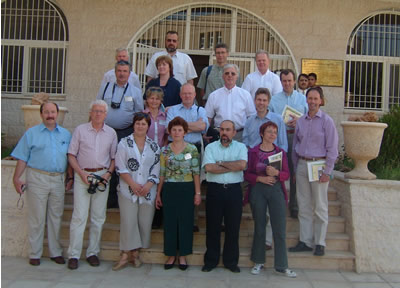
42nd Meeting of the Working Party on Phytosanitary Regulations
Amman, 2004-06-22/25
The 42nd Working Party for Phytosanitary Regulations took place in Amman, on 2004-06-22/25 at the kind invitation of the Jordan NPPO. It had the opportunity to visit the Quarantine Institute in Amman. Participants were also given the opportunity to visit Petra after the meeting.
EPPO Standards
The following EPPO Standards were considered ready to be submitted for approval by Executive Committee and Council in September 2004:
General Phytosanitary Measures (series PM 1)
Addition to the A1 list: Tuta absoluta, Agrilus planipennis
Addition to the A2 list: Tomato chlorosis crinivirus, Cucurbit yellow stunting disorder virus, Ips subelongatus, Ips hauseri, Sirex ermak, Xylotrechus namanganensis
Transfer from A1 to A2 list: Xanthomonas axonopodis pv. dieffenbachiae, Scirtothrips dorsalis, Squash leaf curl begomovirus, Dacus ciliatus, Monilinia fructicola
Deletions from the EPPO lists: Strawberry witches’ broom, Apple mosaic virus (Rubus), Black raspberry latent virus, Cherry leafroll virus (Rubus).Phytosanitary procedures (series PM 3)
Area freedom and production and distribution system freedom for potato
Production of pathogen-free minitubers of potato
Production of pathogen-free microplants of potato
Post entry quarantine for potatoDiagnostic protocols for regulated pests (series PM 7)
Tomato ringspot virus, Cryphonectria parasitica, Phoma tracheiphila, Mycosphaerella dearnessii, Mycosphaerella pini, Trioza erytreae, Aonidiella citrina, Diaphorina citri, Lopholeucaspis japonica, Rhizoecus hibisci, Scirtothrips spp., Liriomyza spp (DIAGPRO), Pseudomonas syringae pv. persicae
Clavibacter michiganensis subsp. michiganensis, Xanthomonas axonopodis pv. citriCommodity-specific Phytosanitary Measures (series PM 8)
Commodity-specific phytosanitary measures for potato

Phytosanitary treatments
The Working Party proposed terms of reference for a Panel on Phytosanitary Treatments. This Panel should in particular address both treatments of commodities and treatments of crops for containment or eradication of pests. Concerning treatments of commodities, the Panel should address required treatments of commodities in the exporting country, or during transport, as well as treatment of commodities after import in case of non-compliance. It should also contribute to the work of the ICPM Technical Panel on Phytosanitary Treatment.
ICPM issues
The Working Party was informed about subjects discussed by the Interim Commission for Phytosanitary Measures (ICPM) and by the Standards Committee. Revised working procedures for European Stewards and European Experts for ICPM Working groups have been adopted. The Working Party recommended that further discussion should be conducted on the issue of pest reporting on the IPPC International Phytosanitary Portal. The Working Party recommended that the Secretariat should organize a Workshop on ISPM n°15 "Guidelines for regulating wood packaging in international trade" complementary to the one organized at the international level.

Conclusions of the Workshop in Sochi
The Working party considered the conclusions of the Workshop for heads of NPPOs held in Sochi (RU) on 2004-06-07/11. It recommended that the present EPPO A1 and A2 lists should be abolished (i.e. EPPO Standard PM 1/2 should be withdrawn), though the concept of A1 and A2 should be retained with a simple geographical significance. It was also considered that the EPPO Secretariat should maintain a database of significant pests for the EPPO region, which are documented on the EPPO website. This should in many respects replace the EPPO A1 and A2 lists for the purposes of EPPO documentation. It should include in particular pests which are regulated by EPPO member countries, but also as appropriate other pests (pests which are of specific current concern, pests which were formerly regulated, etc.). The list should be established by the Secretariat, but subject to overall approval by the Working Party on Phytosanitary Regulations. The Working party also considered that further discussion was needed on possible recommendations on deregulation of pests. The EPPO Secretariat should continue to maintain the Alert List as it is at present.
PRA
The Working Party confirmed its recommendation made in 2003 to create a new panel on PRA. This Panel should perform pest risk assessment on selected pests to determine whether they present a significant risk for the PRA area (usually the EPPO region) and to identify the endangered area within that area. It should perform pest risk management on these pests by identification and evaluation possible phytosanitary measures and by selecting a range of options that provide a significant reduction of the risk of introduction and spread of the pest. Is should deliver a report of this pest risk analysis, accompanied by sufficiently detailed documentation, in particular on the efficacy and practicability of the options, to support technical justification of the phytosanitary measures which may be taken. The report should be of good quality (suitable for publication). The structure of the Panel ensures automatically that all its work is reviewed by peers. A structure should be developed for this purpose.
Diagnostic protocols
The Working Party considered that the objectives of EPPO diagnostic protocols should be clarified. It was in particular indicated that the full procedures recommended in diagnostic protocols were often followed by laboratories only in "critical cases" (e.g. detection of a pest in an area where it is not known to occur, detection of a pest by a laboratory for the first time, detection of a pest in a consignment originating from a country where the pest is declared to be absent). Some of the diagnostic protocols differentiate critical cases from other cases and thus reflect current practice in diagnostic laboratories to follow a simplified procedure for non-critical cases. The Working Party considered that this issue should be discussed further by the Panel on Diagnostics. The Working Party also discussed the issue of reporting of a diagnosis and the issue of precision and reliability of diagnosis. It recommended that these issues should also be discussed by the Panel on Diagnosis and that a horizontal standard on reporting of a diagnosis should be developed.
Other topics
The Working Party reviewed the progress report of the Panel on Alien Invasive Species and considered that guidelines for the control of invasive species should be developed (e.g. Solidago nemoralis, Hydrocotyle ranunculoides, Solanum elaeagnifolium) as well as recommendations regarding the phytosanitary regulation of species based on pest risk management.
The following draft standards were recommended for country consultation: Sampling of consignments for visual phytosanitary inspection, Intentional import of living organism that are plant pests or potential plant pests. The Working Party was informed of all standards being developed by the Organization. The situation of Phytophthora ramorum as well as Diabrotica virgifera was reviewed.

